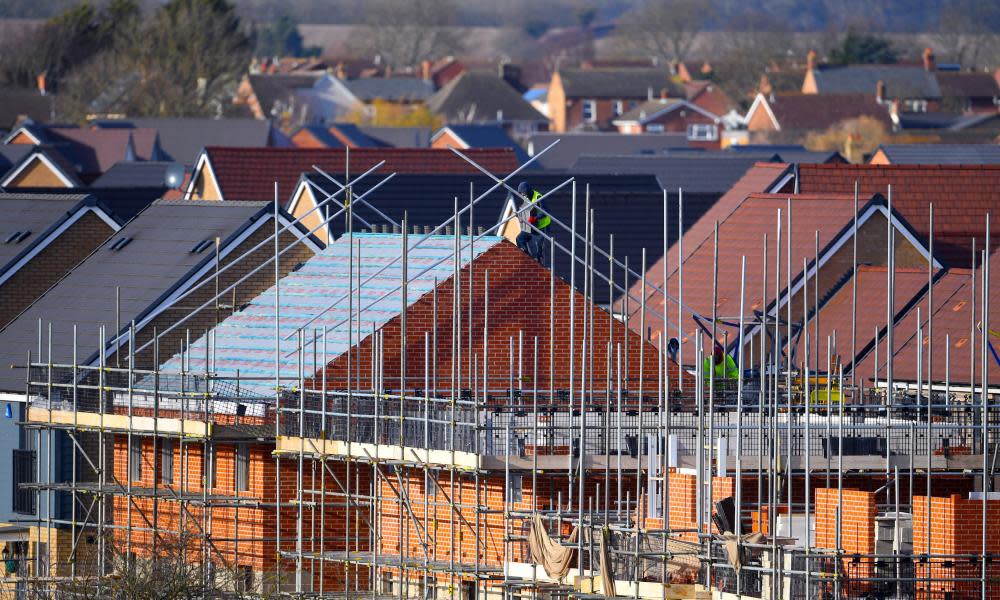The housing crisis will only get worse under the Tories' planning proposals

The Tories’ proposals to overhaul the planning system in England are well-timed, strategically impressive – and utterly disastrous. One of the first big examples of the kind of reform the landslide election victory now allows them to get away with, they are also using the exceptional circumstances of the pandemic to further limit scrutiny of their plans.
But even this red-tape blitz does nothing whatsoever to solve the real problem with housing: a crippling dependence on high property values that has backed the nation into a corner, with neither the government nor the construction industry having any real imperative to build a way out of it.
There is so much to be dismayed about in these new proposals: the drastic reduction in democratic accountability, the total inadequacy of the proposed guidelines that will control new development, the tired old war against local government, the ultra-conservative ideas about “beauty” which will supposedly sweeten development, the presumption that a laissez-faire approach for the making of cities has ever worked, or is in any way desirable.
Related: Extending help-to-buy will only make the housing crisis worse | Laurie Macfarlane
The audacity of those involved is also incredible. The housing minister, Robert Jenrick, is still in post after a recent planning scandal that in any previous year would have led straight to resignation, the late “beauty guru” Roger Scruton’s hard-right connections and odious views were shrugged off, while, in a post-Grenfell world, the idea that excessive planning oversight is a problem requiring urgent removal is deeply insulting.
It is obvious who stands to benefit. Property developers will have an easier time plotting their operations, with a reduced chance of objections or arduous levies on things such as social or affordable housing. The rule changes will probably allow for a small increase in production through reducing risk for smaller developers, but this is likely to be at the bottom end of the market, which will be worsened by the extension of permitted development rights (PDR). PDR, which allows for conversion of real estate into housing without the requirement for permission, have been so scandalously “successful” that the government was recently forced to amend the legislation, confirming that yes, dwellings do require at least one window. The changes are a good result for the property and construction industry, members of which are very generous donors to the Conservative party, giving more than £11m in less than a year.
These proposals are about as close to the cliche of “fiddling while Rome burns” as you’re likely to find, as they do nothing whatsoever to address the real issue of the UK’s chronic dependence on house prices. It is maddening that one simple fact is not given more credence, namely, that due to the extremely slow rate of replacement of existing houses, the housebuilders and developers have a clear and obvious incentive not to build too much, lest they lower the value of their product. Only a developer protected from the profit motive, such as the state itself, could ever have any incentive to produce houses at a rate that would lower the cost of housing overall. Instead, sites with planning permission are left empty, inflating value, while the builders, developers and Tories blame the planning system for the inaction.
But it’s worse than that, because despite the protests and the calls to do something, the housing crisis is one of the things that holds this country together. It’s a perfect storm: 63% of households in England are homeowners, down from a peak of 71% before the 2008 crash, and homeowners are consistently far more likely to vote Conservative. The Thatcherite belief in the importance of property-owning democracy is both a moral position and an expedient strategy, and helps explain why the Tories are so desperate to demolish large (if “ugly”) council homes in favour of tiny, “beautiful” private dwellings. It is surely also the case that the rush of awful PDR homes is a scramble to add new rungs to the bottom of the housing ladder, to replenish the stock of Tory voters.
But the situation is even worse than that, because if we imagine for just a moment that we had a government that wished to solve the housing crisis, then the economic facts are daunting: property wealth in the UK is worth £5.09tn, 35% of all wealth, while 91% of all household debt is property debt. Combine this with the fact that house prices across the UK have nearly tripled since the year 2000, and you realise just how intrinsic this crisis is to the status quo.
What this means is that, effectively, the sense of stability and respectability of millions of people in this country is fundamentally tied to continually increasing property values, and if anything were done to alter this, more than half the population would suddenly find that they were nowhere near as comfortable as they thought they were – which would spell political disaster.
The Tories are smart enough to know not to rock the boat, but refuse to face the fact that every year that this ridiculous situation is allowed to continue, society just rots further – and no amount of favours delivered to their pals in the property industry will help.
• Douglas Murphy is a writer and architect

 Yahoo News
Yahoo News 
